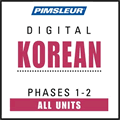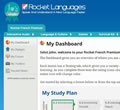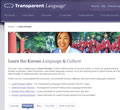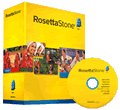Learn Korean
 |
 |
 |
 |
 |
|
| Pimsleur Korean | Rocket Korean | Living Language Korean | Transparent Korean | Rosetta Stone Korean | |
| Your Rank | #1 | #2 | #3 | #4 | #5 |
| Your Rating | |||||
| Learning Material |  |
 |
 |
 |
 |
| Audio Lessons |  |
 |
 |
 |
 |
| Language Games |  |
 |
 |
 |
 |
| Word Tools |  |
 |
 |
 |
 |
| Virtual Teacher |  |
 |
 |
 |
 |
| Usability |  |
 |
 |
 |
 |
| Features |  |
 |
 |
 |
 |
| Ease of Usage |  |
 |
 |
 |
 |
| Support |  |
 |
 |
 |
 |
| Price Value |  |
 |
 |
 |
 |
| Total Score |  |
 |
 |
 |
 |
| Review | Read Review | Read Review | Read Review | Read Review | Read Review |
| Lowest Price | $265.95 | $99.95 | $179.95 | $150 | $299 |
| Website | Visit Site | Visit Site | Visit Site | Visit Site | Visit Site |
Notes
Korean is broadly considered a language isolate, which means a natural language with no demonstrable genetic relationship with other languages. Some dispute this, however, and suggest the language has its roots in the family of Altaic languages, which includes the Turkic, Mongolic, Tungusic, Koreanic, and Japonic languages.
Traditaionally, Korean was written using Hanja, a system of adapted Chinese characters. This was supplemented by phonetic (speaking) systems like hyangchal, gugyeol, and idu. At the turn of the 15th century, Sejong the Great introduced a national writing system called hangul, but it didn't really catch on until the 20th century, largely because the Korean aristocracy preferred to use hanja, and thus the people followed suit.
Korean has approximately 78 million speakers worldwide, and is also one of the two official languages in China's Yanbian Korean Autonomous Prefecture. The language is spoken in both North and South Korea; the only difference being that in South Korea the language is formally called Hangugeo or Gugeo (translated as "national language"), and in the north as Chosonmal, or more formally as Chosono. There are also regional variations with slightly different dialects, as is the case in the majority of Asian countries.
Many liken learning Korean to learning Japanese, citing apparent similarity in vocabulary and grammatical features. This would put Japanese speakers at a slight advantage when learning the language, but not greatly so, as Korean is by all accounts a unique language that requires considerable dedication to achieve spoken and written proficiency.
The emergence of South Korea as a growing economy has attracted increased tourism and investment, particularly in the capital, Seoul. In addition, this growth has seen an increasing number of Koreans studying overseas in Europe and the USA. This has resulted in a Korean popularity boom, both as a language and popular culture (music and fashion).
Comparison Table Analysis
Learning Korean takes passion and dedication. It's a complicated language with awkward vowels and innovative sounds unheard in other languages. Of course, you may just want to learn a few phrases for a holiday, which will be easy enough, but to become proficient and understand those Korean movies you love so, you will need to set aside time for learning each day.
Consistency and immersion is key here, and for that I always recommend investing in home learning software, such as those listed above in my comparison chart. The reason for this is that you aren't tied down to the regimentation of a class, nor the expense. You can fit in study around your work schedule and family, which is something that can be difficult with children and/or a busy work life.
The comparison table ranks our top 5 options for learning Korean at home. Rocket Korean is very popular choice due to it's interactive, fun approach, as is Pimsleur, which is a tad more formal but still very effective. Pimsleur, however, is expensive, and if you aren't confident you'll go beyond the basics, you'd be wise to be a little more conservative with your purchase.
Living Language Korean is a fairly recent addition to the Korean language learning space, but again it's difficult to see why they've priced it so high, considering Transparent Korean and Rocket Korean both offer equal or more value, and have a solid reputation for delivering quality learning materials and high-level customer service.
Before you make a start, consider what level you want to learn to, how much Korean you know already and of course how much you have to invest in your learning experience. I recommend you read my reviews thoroughly by clicking on the "read review" button at the bottom of the table and if you don't have time for that, then at the very least compare the pricing vs. ratings columns and make a quick but informed decision based on those factors.

